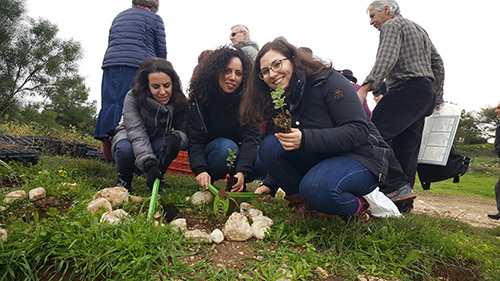By Kara Kimmel

There is a story from the Talmud of an emperor who stumbled upon a very old man planting a tree in the desert. The emperor stopped, and asked, “Old man, why are you planting these tree seeds when you will not see or taste the fruits of your labor?” The old man replied, “I eat the fruit and take shelter from the trees of my grandfathers. So, I plant these trees for my grandchildren’s survival.”
Afforestation has been a deeply rooted aspect of Jewish tradition since ancient times. Since 1901, Jewish National Fund (JNF-USA) has carried on this legacy, planting over 260 million trees in Israel, ‘greening’ what was once a desert. While JNF’s tree planting has made the Jewish homeland bloom, trees also have a much deeper meaning to Israel and the Jewish people.
When Phyllis Erlbaum Zur heard that Nefesh B’Nefesh, a JNF partner that helps Jews make aliyah and realize their dream of building a life in Israel, was organizing a trip to Neot Kedumim, Jewish National Fund’s Biblical Nature Reserve near Jerusalem, to celebrate Tu BiShvat with 70 other olim [new immigrants], she felt it was fate. Sadly, one year ago, Phyllis’ sister, Karen, passed away, and the visit to Neot Kedumim coincided with her one-month aliyah anniversary. With mixed emotions in-hand, Phyllis and her husband, Nizan, planted their first tree together as Israeli citizens, celebrating the renewal of life and nature on Tu BiShvat. As she dug her bare hands into the earth, her eyes swelled with tears and said, “My sister never made it to see Israel. This tree is a physical part of her, and it will be rooted in the land of Israel. It doesn’t get more meaningful than this.” Karen’s legacy will now grow in Israel for Phyllis and Nizan’s 15 grandchildren to come and see.
Nefesh B’Nefesh has brought over 50,000 people to Israel to start a new life. Each new Israeli citizen has a unique story of how they fell in love with the land. For Gabriel Ibghy, a 29-year-old law consultant who made aliyah almost two years ago, it began when he was 16 and on a trip to Israel with his over-night camp. He felt his decision to move his life to Israel was a “relationship that needed to be nurtured over time.” For 27-year-old Danielle Keizer, she was tired of missing critical exams on high holidays and arguing with teachers for the right to practice basic Jewish traditions. That was when she decided to move to Israel to get her Masters in Biology at Bar Ilan University.
From a barren desert to a booming high-tech and ‘Start-Up Nation’, Israel has come a long way from its beginnings. Israel’s founders, farmers, and pioneers not only planted the seeds of today’s forests and built the roads of today’s thriving cities, but also instilled those values of Zionism that are shared today by olim from around the world. To invest in a tree is to invest in Israel’s future. Just as Theodor Herzl could not have imagined the flourishing Israel of today, Jewish National Fund and Nefesh B’Nefesh invest in the next generation of Zionists, because like trees, they will take root and change the landscape for generations to come.
